This week, China’s stock markets saw significant movement, with the Hang Seng Index hitting a new high in three years, driven by the growing optimism surrounding the Chinese AI model DeepSeek and Alibaba’s better-than-expected earnings and ambitious AI investment plan in the next three years.
In this edition of Top China Stocks in Focus, we highlight the companies making waves and explain what’s driving their performance.

The content is for informational purposes only and does not constitute investment advice.
Alibaba Group (9988:HK)
Alibaba Group’s stock surged nearly 15% to close at HK$138.5 on Friday, marking the highest level since November 2021, and the trading turnover exceeded HK$44 billion on the day, setting a new record high.
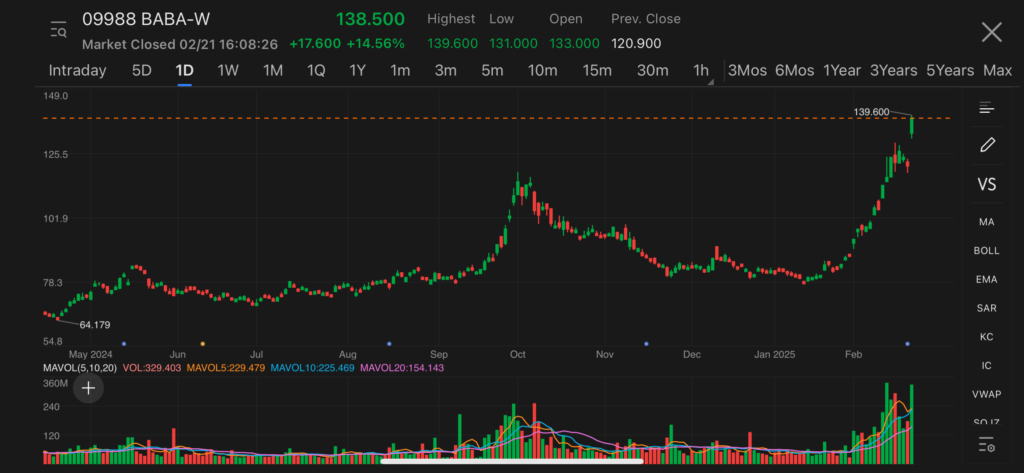
The rally was driven by Alibaba’s fiscal Q3 2025 earnings results, with revenue rising 8% year-on-year and net profit surging 333%, significantly surpassed market expectations, and the company’s quarterly capital expenditure reached 31.8 billion yuan, an 80% surge from the previous quarter.
During the period, the growth of Alibaba’s e-commerce business accelerated, Alibaba Cloud’s commercialized revenue returned to double-digit growth and AI-related product revenue continued to show triple-digit year-on-year growth for six consecutive quarters.
Over the next three years, Alibaba plans to significantly increase investments in AI infrastructure, with the total investment to surpass the amount invested in the past decade combined, said Alibaba CEO Wu Yongming in the conference call.
Global institutions including Goldman Sachs, Citibank, JPMorgan and Barclays have raised their price targets for the stock. Goldman Sachs said that Alibaba’s performance exceeded expectations, and its guidance on AI-related capital expenditures came higher than anticipated. The bank raised its target prices for Alibaba’s US and Hong Kong stocks from $117 and HK$114 to $160 and HK$156, respectively, maintaining a “Buy” rating.
Xiaomi Corporation (1810.HK)
Xiaomi Corporation surged 5.2% to close at HK$51.7 on Friday, marking a new record high, bringing its one-week gain to 15.66%.
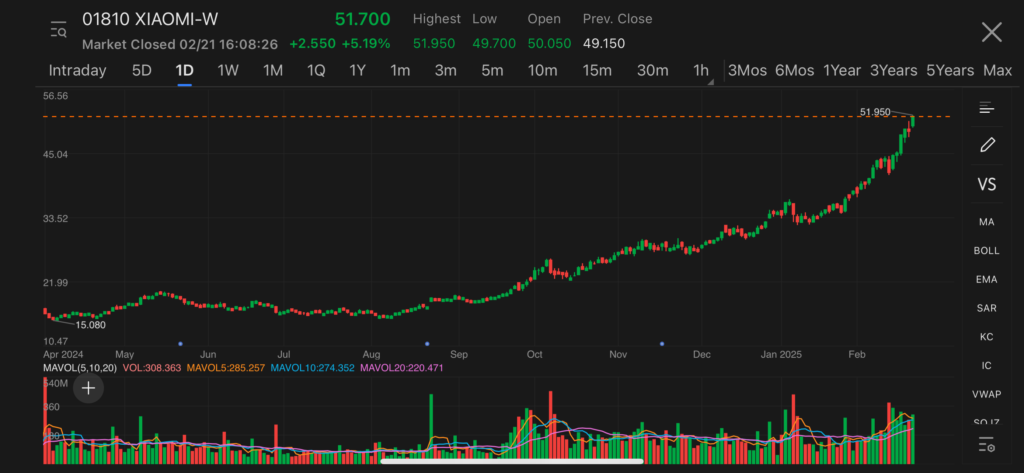
Goldman Sachs raised Xiaomi’s 12-month target price by more than 50% from HK$38 to HK$58, representing a 12% increase from the closing price on Friday, and reiterated its “Buy” rating.
Xiaomi’s strategy in AI and IoT, through the development of an operating system-level AI assistant Xiao AI and the world’s largest AIoT ecosystem, is expected to drive strong growth in the coming years and position Xiaomi as a potential winner in the AI industry, Goldman said.
Xiaomi is in a favorable position to enhance its AI capabilities more efficiently, expand its “people × car × home” ecosystem via AI, and drive sales growth, and it’s also likely to move upstream toward the internet/software services sector in the long term, it noted.
BofA Securities reiterated its Buy rating on Xiaomi and raised the target price by more than 40% from HK$37 to HK$52, saying that it has gained more confidence in Xiaomi’s competitive advantage in the electric vehicle sector after an on-site inspection of its Beijing factory earlier in February. Leveraging its robust brand image and rapidly expanding production capacity, Xiaomi’s profitability is expected to sustain growth, driving an upward valuation, it noted.
BYD Company (1211.HK)
BYD Company surged 4.64% on Friday to close at HK$392.4, hitting a new record high of HK$398.6 at one point. Its Shenzhen-traded shares jumped 5.57% to end at 383, hitting an all-time high of 386.5 yuan during the session.
On February 14, BYD’s A-share market value once again surpassed the one trillion yuan mark, nearly two and a half years after its first breakthrough in June 2022.
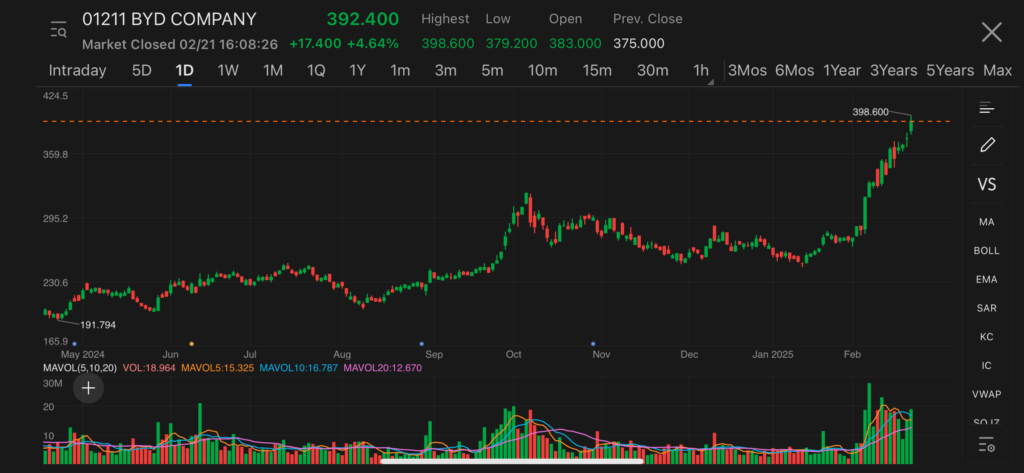
BYD has been in a rally after it unveiled its ambitious “Smart Driving for All” strategy on February 10, releasing over 20 models equipped with the “God’s Eye” advanced driver assistance system. Among them, the BYD Seagull, priced at 78,800 yuan, will be equipment with features like highway navigation NOA and automatic parking.
UBS said in a research note that the release of the “God’s Eye” system will enhance product competitiveness and help the company gain a larger market share. In addition, BYD holds a dominant position in its supply chain and has strong bargaining power, allowing it to absorb the extra costs associated with adding intelligent driving features without increasing product prices, thus maintaining stable profit margins, the bank notes.
JPMorgan has reiterated its Overweight rating for BYD and raised the target price from HK$475 to HK$600, expecting the company to become the “Toyota” in the global electric vehicle market.
After communicating with nearly 200 investors in the past week and participated in BYD’s reverse roadshow, JPMorgan believes investors are becoming increasingly bullish on BYD’s long-term development prospects in both domestic and international markets.
JPMorgan expects BYD’s global delivery volume to reach 6.5 million units next year, with about 1.5 million units coming from overseas markets, which means its market share in the global light vehicle market will increase from 3% in 2023 to 7% next year; while in the new energy vehicle sector, its market share is expected to remain around 22%.
Citigroup said that BYD has seven key growth catalysts, including rising electric vehicle penetration, year-on-year growth in China’s automotive exports in February and March, year-on-year growth in domestic wholesale car sales in February and March, the launch of seven new models by BYD this month, the expected launch of 14 new models in March and April, the release of a new 1000V BEV platform in March, and the upcoming introduction of new Han L and Tang L models.
Lenovo Group (0992.HK)
Lenovo Group’s surged about 15.5% to close at HK$13.6 on Friday, marking a new record high, with its market capitalization rising to about HK$168.7 billion.
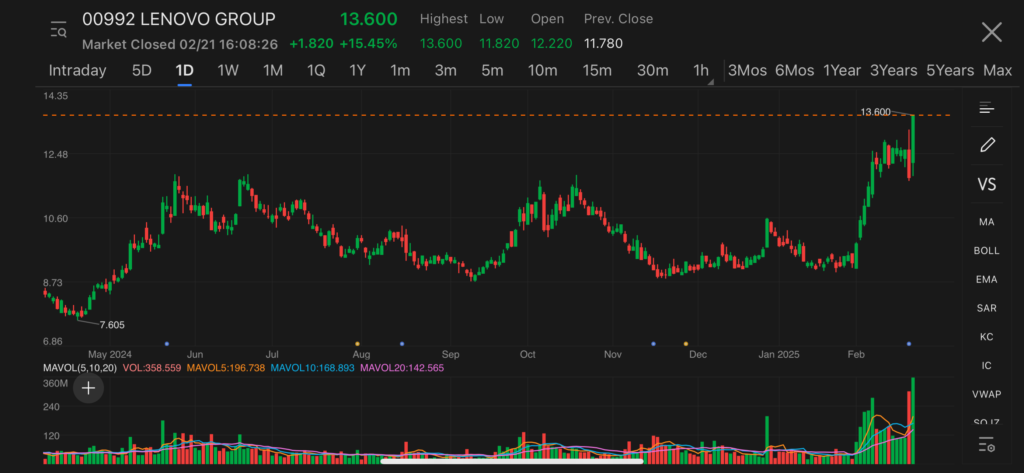
The rally came after the company reported a revenue of 135.1 billion yuan for Q3 FY2024, a 20% year-on-year increase, and net profit surged 106% to 4.98 billion yuan, with all three core business segments achieving double-digit growth during the period.
Lenovo announced that its PCs and smartphones have been integrated with cloud-based DeepSeek. Leveraging DeepSeek’s technology, Lenovo has enhanced its models through distillation and compression, enabling larger vector models and combining them with more powerful computing terminals to enhance generative AI experiences, the company said.
Liu Jun, Lenovo’s Executive Vice President, said that Lenovo is expanding its collaboration with DeepSeek in both personal and enterprise AI and it will roll out a major upgrade to its Tianxi AS on February 25, making it the first AI PC manufacturer to deploy the DeepSeek 7B large model on the edge.
Goldman Sachs maintained its “Buy” rating on Lenovo and raised its target price from HK$13.28 to HK$14.90. The bank increased its forecasts of Lenovo’s profit in FY2025 and FY2026 by 23% and 4%, respectively, mainly due to higher revenue, reflecting optimism about Lenovo’s AI personal computer (AIPC) production capacity increase in FY2025 and the expansion of AI servers.
The bank expressed a positive outlook on Lenovo, viewing it as an early beneficiary of AIPC. The company’s strong brand recognition, exposure to commercial and mid/high-end models, and leading market position will attract more collaboration from major chip platform and foundational model suppliers, Goldman said.
Hua Hong Semiconductor (1347.HK)
Hua Hong Semiconductor surged 9.2% to close at HK$40.3 on Friday, after hitting a new record high of HK$41.45 at one point in the session, bringing its one-weak gain to more than 57%. So far this year, the stock has surged more than 86%.
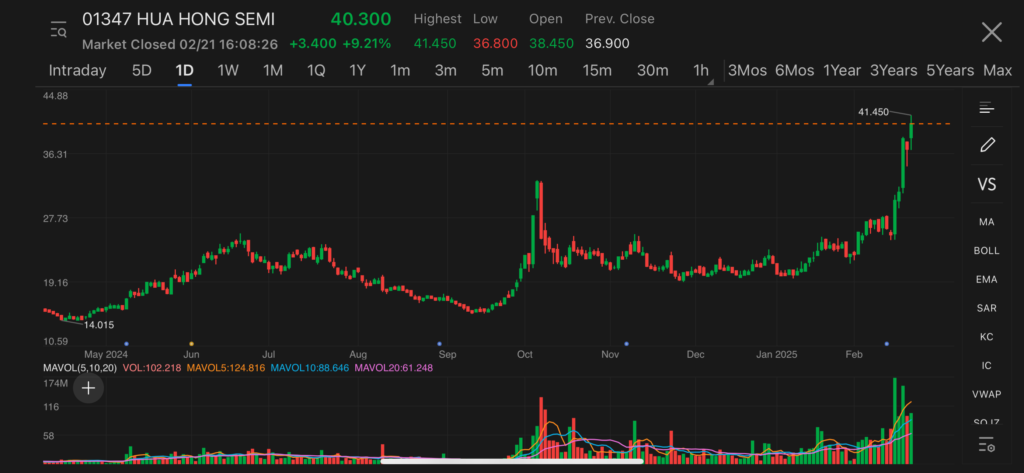
The acceleration of domestic AI chip adaptation to DeepSeek is pushing forward the localization of the semiconductor supply chain and AI-driven innovations are fueling rapid advancements in computing power, semiconductors, and terminal devices, TF Securities notes.
The launch of DeepSeek-R1 and other domestic AI models has spurred a surge in chip adaptation by leading domestic semiconductor firms such as Huawei Ascend, Hygon, Cambricon, and Loongson, which has fostered the ecosystem of “domestic AI models + computing chips,” China Merchants Securities said.
During the latest conference call, Hua Hong’s management said that the company has observed strong demand for AI-related products such as data center and power management chips.
Great Wall Securities noted that Hua Hong’s Wuxi 12-inch production line, which is entering trial production and process verification, could release a capacity of 20,000 wafers per month by the end of 2025, supporting further earnings recovery.
Supported by new capacity expansion, localized production strategies, and national consumption stimulus policies, Hua Hong is well-positioned to drive revenue growth through increased wafer shipments, CICC noted. The bank raised its target price for Hua Hong Semiconductor’s Hong Kong stocks by 22.8% to HK$27.5, maintaining its Outperform rating.

